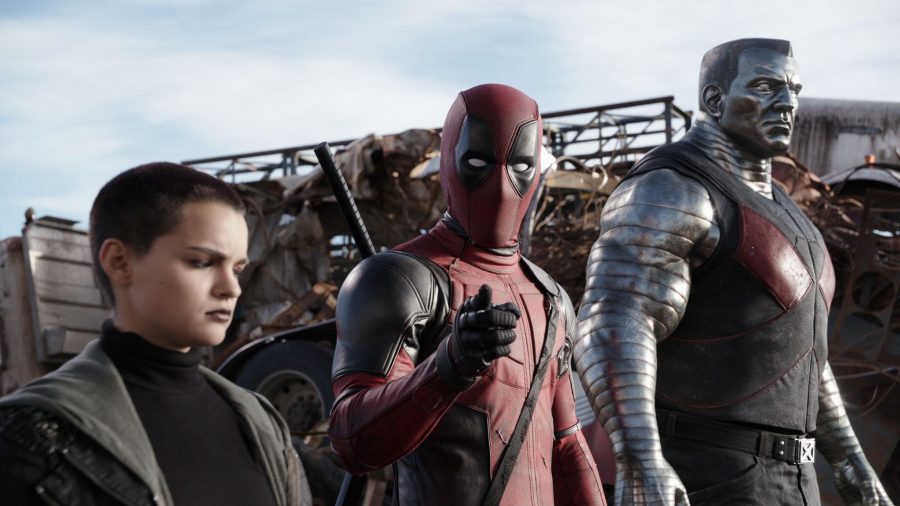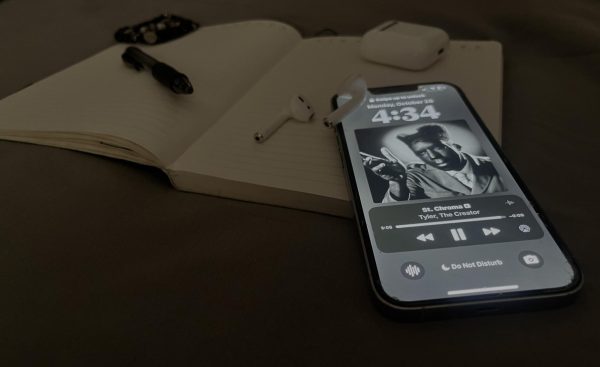‘Deadpool’ invigorates the superhero genre despite its flaws
Deadpool (Ryan Reynolds) pauses from a life-and-death battle to break the fourth wall, much to the dismay of his comrades Negasonic Teenage Warhead (Brianna Hildebrand) and Colossus (voiced by Stefan Kapicic).
Even the biggest of comic book fans can admit that there has been a recent superhero movie fatigue over the past couple of years. With Marvel cranking out three to four movies every year and Warner Bros. trying to getting things rolling with DC, it’s hard to be substantially impressed by these grand spectacles after seeing so many so often, no matter how fun the movie may be. Thankfully, 20th Century Fox, who’s had quite a few missteps with their Marvel Cinematic Universe, somehow managed to cleverly veer from the comic book movie norms with the breath of fresh air that is Deadpool.
Blabbering its way into theaters on Feb. 12 just in time for Valentine’s Day, this origin story is that of Wade Wilson’s (Ryan Reynolds), an ex-mercenary who is stricken with cancer after having proposed to his “future baby mama” Vanessa (Morena Baccarin). Catching the eye of a private institution who promises him to cure his cancer, Wilson leaves Vanessa and is subjected to a series of harsh experiments, conducted by the malevolent Ajax (Ed Skrein), that aren’t aiming to cure his cancer but to expose his mutation, as this does take place in the X-Men universe. Through this torture, he receives accelerated healing powers and takes on the alter ego, Deadpool, setting on a path of vengeance towards Ajax in an effort to return back to normal.
There’s plenty to admire here, beginning with the guts this movie and the studio had to go all out and make an R-rated adaptation that stays faithful to the character as opposed to a watered-down PG-13 that would’ve made it more accessible. It’s refreshing to see a comic book movie that subverts the notion set by other movies of the same genre where no matter how much pain is inflicted upon our hero or their enemy, the visual evidence of that pain is kept ridiculously mild. That is not the case here at all. The action is hard-hitting, marvelously gory and far more impactful than anything in the Avengers movies due to its sheer graphic nature, which obviously may be unpleasant to some, but ultimately works to enhance the film.
The instances of practical fight choreography stand out over some of the other more CGI-oriented sequences, particularly the final battle which relies far too heavily on special effects. The film had such great momentum going into its finale with fairly little use of CGI, so there was no need for the climax to involve something as unnecessarily grandiose as a helicarrier explosion. Some computer-generated aspects, such as the implementation of Colossus (Stefan Kapicic) and the powers of Negasonic Teenage Warhead (Brianna Hildebrand) are more simple and the light touches done in post looked quite fine and the actors made it all quite convincing. But as for the finale, it was cheap and could’ve easily been substituted with a small-scale brawl that would’ve been equally powerful.
But of course, it wouldn’t be a Deadpool movie without an abundance of absurdly profane humor, which works for the most part. The thing with Deadpool’s humor is that it’s not subtle in the slightest; it’s nonstop, crude and lacks almost any sort of wit. That works at times, but at others it gets heavy-handed very quickly and just becomes exhausting, similar to the whole fourth-wall-break gimmick. The first couple times it’s used to make fun of Green Lantern and X-Men Origins: Wolverine, it’s genuinely funny and unique. Reynolds embodies this character as perfectly as Robert Downey Jr. embodies Iron Man and he executes the comedic nature of the film quite tremendously for the most part. But after a while, the whole shtick becomes a bit full of itself and assumes that if it just makes fun of its problems, such as its small budget and predictability, then it’s okay for the film to be bad because it acknowledged that it is. Unfortunately, that’s not how it works. The humor would’ve been much better had it been used sparingly, despite its moments of effectiveness.
This is nowhere near as bad as last year’s Fantastic Four and nowhere near as good as the resurgence of the X-Men films, but Deadpool is still enjoyable enough to benefit Fox’s Marvel Cinematic Universe and can hopefully sustain itself as a successful franchise.

INTERESTS/HOBBIES: Inter-dimensional travel.
EXTRACURRICULAR ACTIVITIES: Stopping Dr. Doom.
THREE WORDS TO DESCRIBE ME ARE: This isn't science.
IN...













